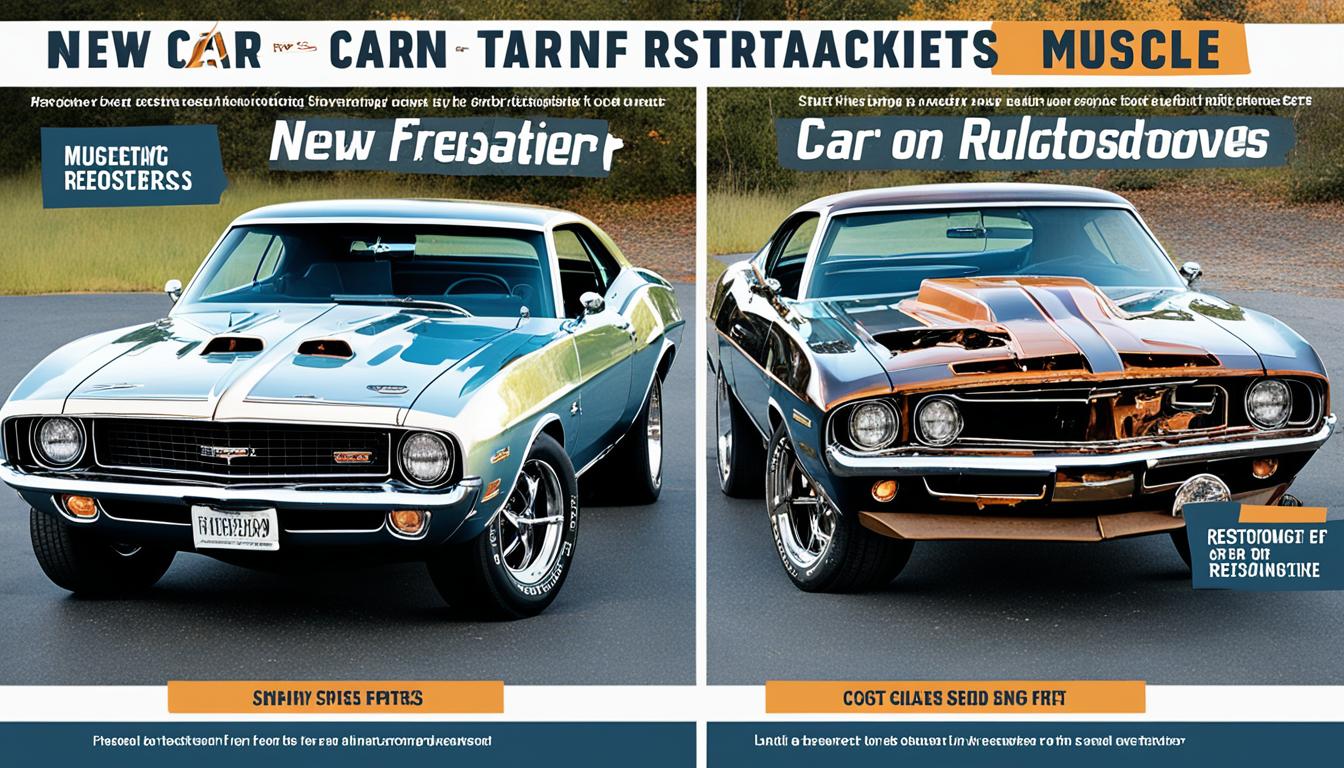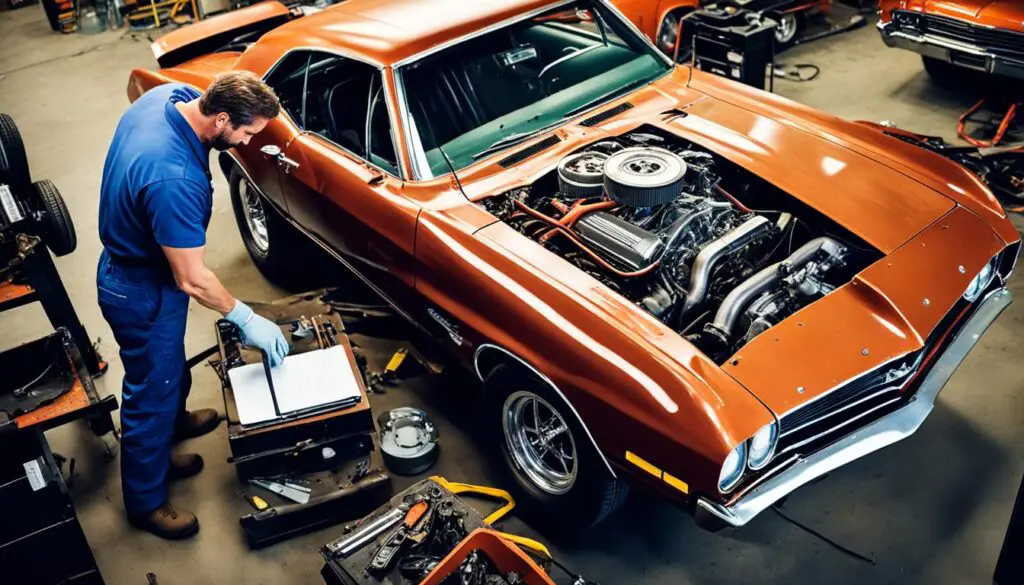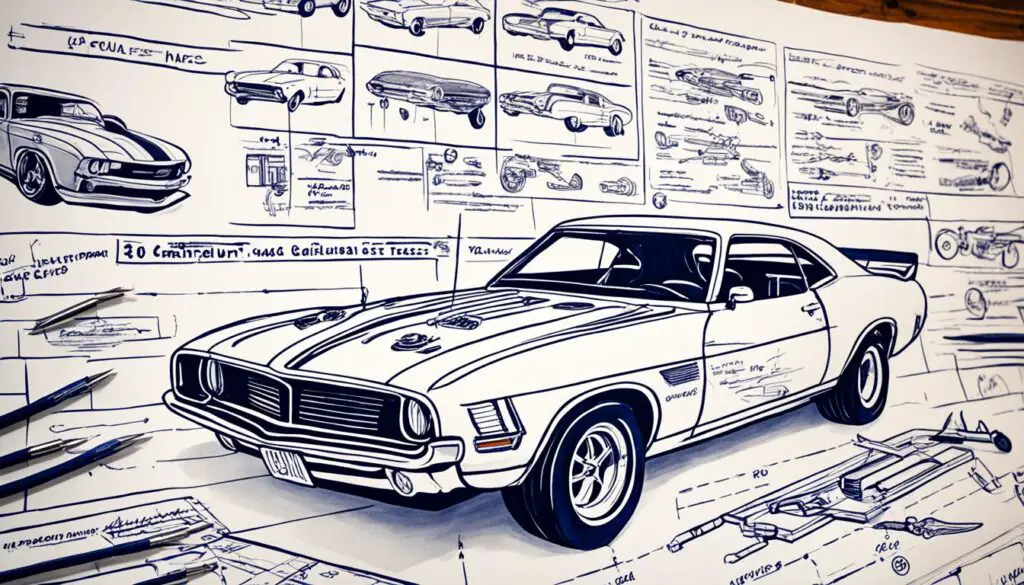
Budgeting Beauty: Muscle Car Restoration Cost Guide
Many car lovers dream of restoring a muscle car. But, it’s crucial to think about the money. I’m a big fan of classic cars and fixing them up. I know how important it is to plan your budget for restoring a muscle car. This article will help you understand the costs and give you tips on budgeting for your restoration project.
Key Takeaways:
- Restoring a muscle car can be an expensive endeavor, so it’s crucial to plan and budget accordingly.
- Factors to consider include the initial purchase price, cost of parts and labor, and unexpected expenses.
- By being realistic about your budget and carefully planning your expenses, you can avoid overspending.
- Thoroughly assess the condition of the car before starting the restoration process.
- Create a comprehensive plan and budget, outlining tasks, a timeline, and estimated costs.
Assessing the Condition: A Critical Step in Muscle Car Restoration
Before starting a muscle car restoration, check the car’s condition well. Look closely at the outside and inside for wear, rust, or damage. Doing this lets you figure out what needs the most work.

Document any problems you find during assessment. This info is key for tracking your project’s progress. Also, it’s important to set clear goals based on what you see. It will help you imagine the restored car.
Evaluating Restoration Goals
- Evaluate the extent of mechanical repairs required
- Restore the car to its original design and specifications
- Address and fix any structural or cosmetic imperfections
Learn about the car’s original design and think about what you want. Then, you can set goals that you can actually reach. This is important for making good choices during the restoration.
Checking the car’s condition and defining your restoration goals are both crucial. They start your restoration off right. By spending time and energy on these steps, you can make sure your project is a success. This way, you keep the car’s history alive and show your love for these classic rides.
Planning and Budgeting: Key Steps for a Successful Muscle Car Restoration
After checking my muscle car’s condition and figuring out what to restore, I needed a solid plan and budget. I listed the tasks, set a timeline, and estimated the costs. This step was crucial for a successful project.
Breaking the project into smaller tasks helped me manage the work better. I focused on the engine, body, and interior first. And by planning when to do each, I used my time and money wisely.
Setting a budget is key to avoid overspending and financial stress. I looked into the costs of parts, labor, and extras like painting. Getting several quotes helped me know the project’s total cost more accurately.
Yet, I always kept a little extra money for unexpected costs. I knew that hidden issues could pop up during the restoration. Planning for these surprises kept my project running smoothly without breaking my budget.
Creating a Restoration Budget
Building a detailed budget plan was a must for my muscle car restoration. I listed everything needed, from engine parts to interior upholstery. This step ensured nothing was left out.
Quote: “Proper budgeting ensures that you have sufficient funds for high-quality parts and professional services, resulting in a top-notch restoration.” – Car Restoration Expert
I shopped around for the best prices and quality. This required research and weighing in on different factors. Making informed choices helped me get the best deals on the restoration items.
Setting a Restoration Timeline
I also created a detailed timeline for the restoration work. I considered how long each task would take and when professionals were available. I also thought of any other factors that could slow us down.
Quote: “Having a timeline helps keep you focused and motivated throughout the restoration process, ensuring steady progress towards your goal.” – Vintage Car Enthusiast
I broke the work into smaller goals with set deadlines. This helped me track my progress and keep on time. It was important to expect and plan for challenges that might delay the project.

A solid plan and budget led me to successful muscle car restoration. It kept the project on track and within budget. With everything planned out, I felt ready to start my restoration journey.
Conclusion: Celebrating the Finished Project
Turning a muscle car from a wreck into a work of art takes love, skills, and lots of time and money. But in the end, it’s all worth it. It brings life back to a car that’s part of auto history and shows my love for these classics.
Once the muscle car is back to its former glory, it’s a big achievement. I can show it off at car events, let loved ones admire it, or cruise down the streets. Seeing my dream car reborn feels amazing.
It’s also crucial to keep it in top shape for the long run. Taking good care of it means more years of joy and pride. Others will love and remember it, making it a valuable part of car history for the next generation.
FAQ
How much does it cost to restore a muscle car?
Restoring a muscle car can be very pricey. It all depends on the car’s purchase price, the cost of its parts and work needed, and any surprises along the way. Planning your budget is key to making the restoration work for you financially.
What should I consider when assessing the condition of a muscle car for restoration?
When checking the car’s condition, look at the inside and outside for wear and tear. Make a list of what needs fixing and set your goals. Knowing what to do and what you want the car to be will guide you. Look up the car’s original specs and think about your restoration vision too.
How do I create a plan and budget for my muscle car restoration project?
Making a detailed plan and budget is key for successfully restoring a muscle car. List all the tasks, make a timeline, and calculate the costs. Make sure to have extra money aside for any surprises. Planning well will keep your spending in check and get your car back on the road.
What can I do to celebrate the completion of my muscle car restoration?
Finishing your car is a big deal, so enjoy it! Show it off at events, let your loved ones see it, or just go for a drive. The joy of having your dream car back is priceless. Don’t forget to take care of it so it stays in great shape for years.
